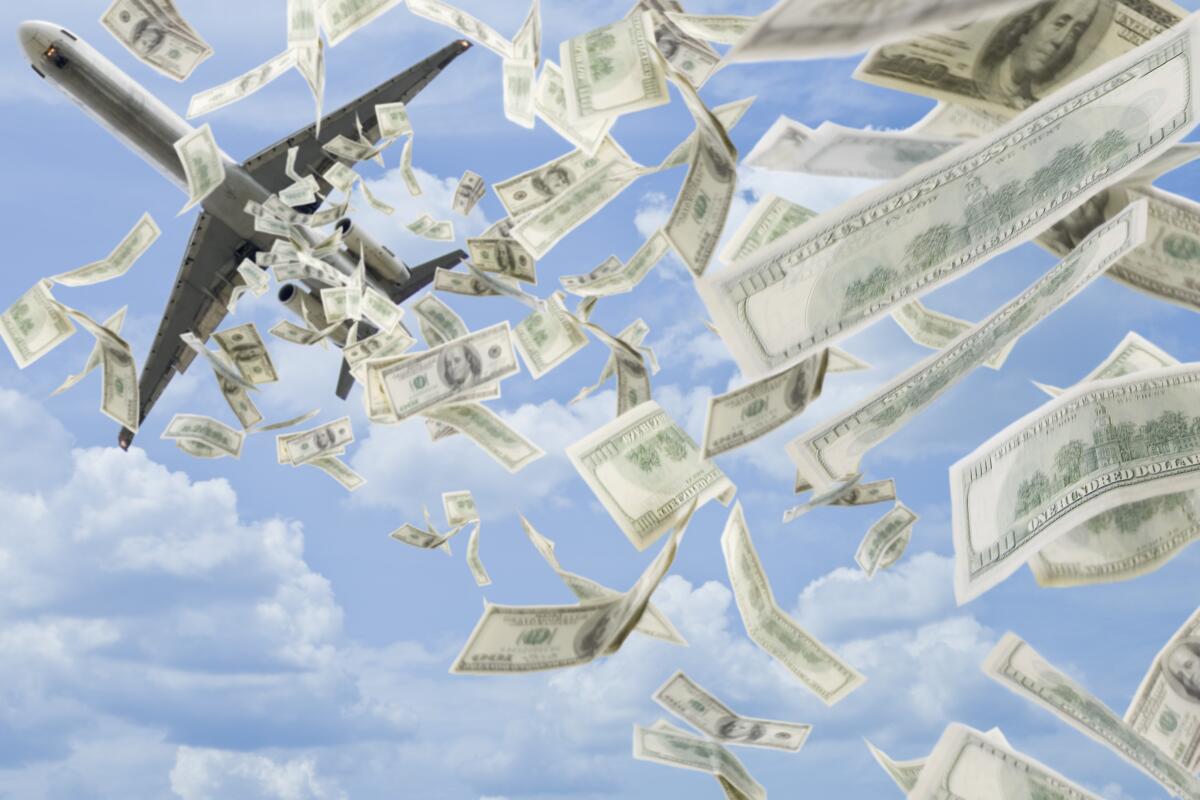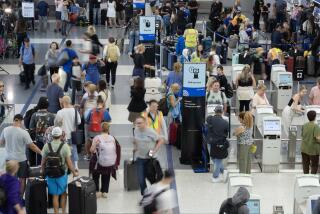Can you get an airline ticket refund due to postponed Olympics or coronavirus crisis?

- Share via
Getting a refund from an airline has never been easy, and it hasn’t become more so in this time of chaos in the airline industry and elsewhere.
I’d welcome you to the Twilight Zone, but anyone who has tried to get an airline refund, even if the flier has died, has already visited the TZ. Now, with the postponement of the Olympics (and pretty much everything else), we may become permanent residents.
Before plunging in, please heed these words from Kurt Ebenhoch, executive director of Travel Fairness Now, a consumer advocacy group. Your chance of getting a refund “varies by carrier, and it’s something that’s in flux right now,” said Ebenhoch, whose group specializes in airline and hotel issues.
“Policies that were in place before are not always holding up as we’re finding that companies want to hold onto money.”
Into this shifting landscape we introduce shifting policy. Fasten your seat belts, friends. Bumpy doesn’t begin to describe it. Here’s what you need to know:
Don’t immediately cancel your ticket
But, you protest, you always advise us to cancel a ticket if we know we’re not going to be able to use it. Shouldn’t I do that now?
No, said Charles Leocha, president of Travelers United, a consumer advocacy group that does extensive work on airline issues.
“If you have a flight planned in the next three or four weeks, do not call up and cancel the flight,” Leocha said, even if you don’t want to go or can’t. “If the airline cancels your flight — and they are canceling flights right and left — you are eligible for a cash reimbursement.”
If the airline cancels the flight and can’t accommodate you within a certain period of time, it is supposed to refund your money.
Supposed to? Why “supposed to”?
Some may offer a voucher first. Don’t fall for it. Ask for the money. Nicely.
But not all airlines are playing by the same rules
Consider the case of United Airlines, which, like all carriers, has been rocked by the coronavirus chaos.
Then it counterpunched, Brian Sumers reported in Skift. United’s policy, like many airlines’, was that you could get a refund if your flight was delayed by more than two hours.
Then United changed that to 25 hours and said it applied retroactively to all tickets. Then the policy changed again, this time to delays of six hours, Sumers said.
And now? “At last check — and this may very well change again — United won’t allow refunds on international travel,” Brett Snyder, who runs CrankyFlier.com, a consumer advocacy site, said in an email Tuesday.
“If your flight changes by more than six hours, you can hold that in a credit. If you don’t use the credit within one year from the original date of ticket issue, then you can get a refund.”
OK, when should I cancel?
You usually can cancel up to about the time of departure, but as the rules shift, Snyder said in an interview, you should give yourself a bit of a buffer — a day or two before your flight. If you don’t cancel and you don’t show up for the flight, you’ll be considered a no-show and you’ll get nothing back.
Hold off on requesting for a refund for Olympics tickets
If you have a nonrefundable ticket, the general cancellation rules apply: You’ll get a voucher, minus a change fee, and it will be good for within a year of the purchase of your ticket, not the flight.
But, Snyder said, “I have seen Japanese airlines be pretty generous with refunds through this coronavirus mess. So it wouldn’t shock me if they added a policy themselves that would allow refunds for Olympic tickets.”
Stay tuned.
Read the airline’s contract of carriage
If you’re looking to while away those lonely hours in lockdown, read the terms and conditions, a.k.a. the contract of carriage, on the airline’s website.
Yes, this may seem like a bigger punishment than having to stay home, but these contracts lay out the ground rules for cancellations. Arm yourself with information before doing anything. Copy relevant parts of the contract on a document you can consult as you’re speaking with an airline representative.
Read your email
The airline may have communicated with you by email about changes to your ticket, its policies or other matters. Get up to date on anything that pertains to the goal you’re trying to achieve.
Determine that goal and adjust your expectations
Understand that getting a refund may be a struggle. It’s that way in the best of times.
Most airline tickets are nonrefundable. They’re almost always cheaper and thus more attractive to leisure travelers.
The downside is that if you want to cancel, you will probably not get your money back. But the downside to that downside is that you may get a voucher good for a year from the date of your ticket purchase, not from the date the trip was to begin. And you’ll have to pay a hefty cancellation fee.
Should I call the airline then?
If you bought your ticket through a travel advisor (formerly called an agent), call the advisor.
If you bought your ticket as part of a cruise package that is no longer going to sail, call the cruise line.
If you bought your ticket through an online travel agency such as Expedia, call Expedia (which asks those who are not traveling within 72 hours to delay calling) or the online travel agency.
If you bought your ticket directly from the airline, call the airline, but be prepared for a wait. Call centers are overwhelmed. Some will give you a callback time so you don’t have to hang on the phone.
Whatever you do, gather your travel information before you call — ticket number, purchase date, credit card and frequent-flier numbers. You may not need all of it, but you won’t be fumbling at the last minute.
Dispute the charge on your credit card
If get nowhere, call your credit card company and file a dispute if you bought your ticket within the last 60 days. The credit card companies carry a fairly large stick when it comes to dealing with their users’ issues. This is a last-ditch effort, and you must be mindful of the 60-day timeline — determined from the date you bought the ticket, not the date of your trip.
File a complaint with the Department of Transportation
Leocha of Travelers United notes that the DOT tells you first to contact your airline to try to resolve your problem. Then, when it receives few complaints about an issue, it may conclude that whatever you’re complaining about is not a problem. But, Leocha said, the DOT has no way of knowing how many complaints were made to the airline because that’s what it told you to do.
To file a complaint, go to the DOT’s Aviation Consumer Protection page (lat.ms/DOTcomplaint). It may not resolve your issue immediately or ever, but at least you will be on the record and a groundswell may result in changes.
Contact your elected representative’s field office
Your elected officials aren’t usually the first people you turn to, but they often can have an enormous effect on the outcome of a dispute, especially if the entity in question is the subject of legislation that involves bailouts.
Bailouts or no, we have seen excellent results in resolving passport problems and, more recently, Global Entry issues.
Finally, deep, cleansing breaths
One of my bosses used to tell me this fairly often. It doesn’t solve anything, but it may calm you a bit. And in this time of turmoil, that’s quite an advantage.
Have a travel problem, question or dilemma? Write to travel@latimes.com. We regret we cannot answer every inquiry.
More to Read
Sign up for The Wild
We’ll help you find the best places to hike, bike and run, as well as the perfect silent spots for meditation and yoga.
You may occasionally receive promotional content from the Los Angeles Times.







